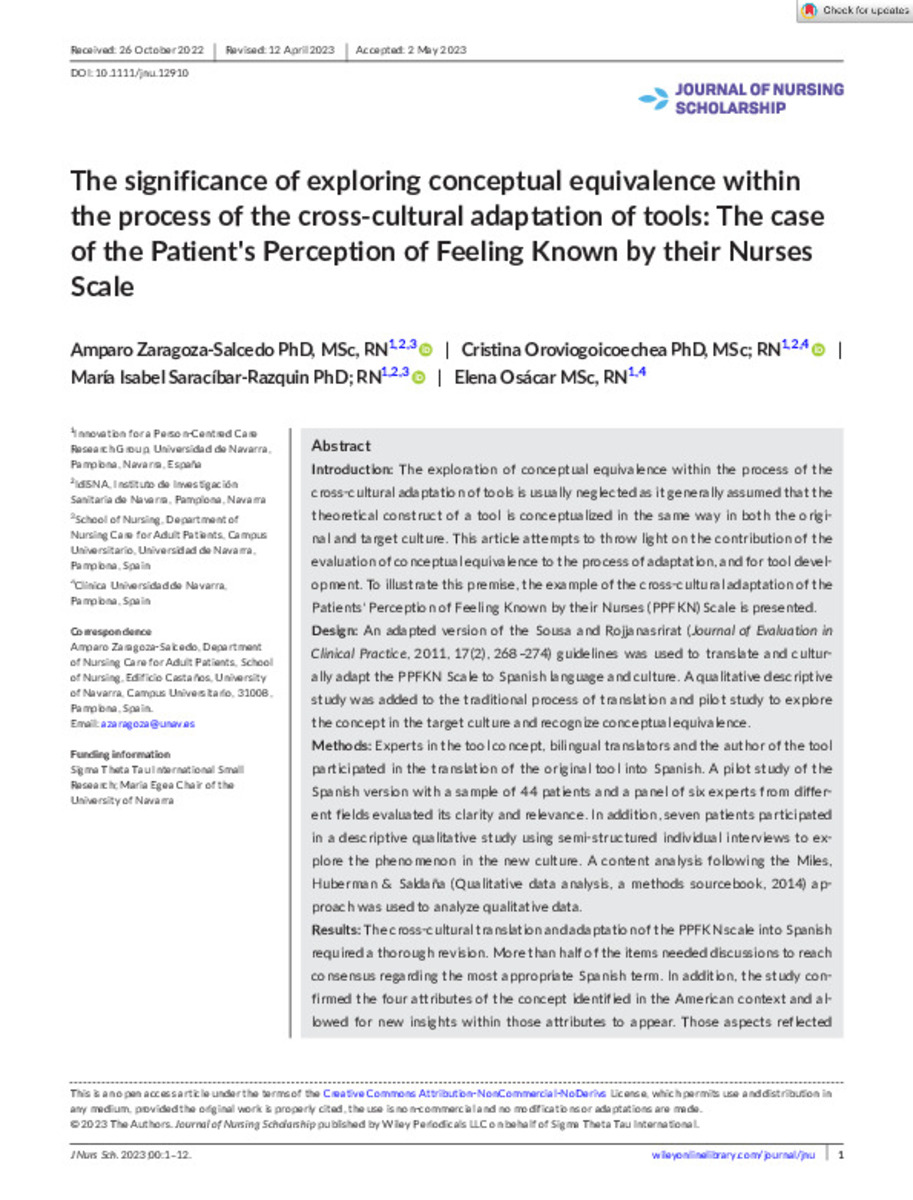Full metadata record
| DC Field | Value | Language |
|---|---|---|
| dc.creator | Zaragoza-Salcedo, A. (Amparo) | - |
| dc.creator | Oroviogoicoechea, C. (Cristina) | - |
| dc.creator | Saracíbar-Razquin, M. (Maribel) | - |
| dc.creator | Osacar, E. (Elena) | - |
| dc.date.accessioned | 2024-01-10T13:49:18Z | - |
| dc.date.available | 2024-01-10T13:49:18Z | - |
| dc.date.issued | 2023 | - |
| dc.identifier.citation | Zaragoza-Salcedo, A. (Amparo); Oroviogoicoechea, C. (Cristina); Saracíbar-Razquin, M. (Maribel); et al. "The significance of exploring conceptual equivalence within the process of the cross-cultural adaptation of tools: The case of the Patient's Perception of Feeling Known by their Nurses Scale". Journal of Nursing Scholarship. , 2023, | es_ES |
| dc.identifier.issn | 1547-5069 | - |
| dc.identifier.uri | https://hdl.handle.net/10171/68259 | - |
| dc.description.abstract | Introduction: The exploration of conceptual equivalence within the process of the cross-cultural adaptation of tools is usually neglected as it generally assumed that the theoretical construct of a tool is conceptualized in the same way in both the original and target culture. This article attempts to throw light on the contribution of the evaluation of conceptual equivalence to the process of adaptation, and for tool development. To illustrate this premise, the example of the cross-cultural adaptation of the Patients' Perception of Feeling Known by their Nurses (PPFKN) Scale is presented. Design: An adapted version of the Sousa and Rojjanasrirat (Journal of Evaluation in Clinical Practice, 2011, 17(2), 268-274) guidelines was used to translate and culturally adapt the PPFKN Scale to Spanish language and culture. A qualitative descriptive study was added to the traditional process of translation and pilot study to explore the concept in the target culture and recognize conceptual equivalence. Methods: Experts in the tool concept, bilingual translators and the author of the tool participated in the translation of the original tool into Spanish. A pilot study of the Spanish version with a sample of 44 patients and a panel of six experts from different fields evaluated its clarity and relevance. In addition, seven patients participated in a descriptive qualitative study using semi-structured individual interviews to explore the phenomenon in the new culture. A content analysis following the Miles, Huberman & Saldaña (Qualitative data analysis, a methods sourcebook, 2014) approach was used to analyze qualitative data. Results: The cross-cultural translation and adaptation of the PPFKN scale into Spanish required a thorough revision. More than half of the items needed discussions to reach consensus regarding the most appropriate Spanish term. In addition, the study confirmed the four attributes of the concept identified in the American context and allowed for new insights within those attributes to appear. Those aspects reflected characteristics of the phenomenon of being known in the Spanish context and were added to the tool in the format of 10 new items. Conclusions: A comprehensive cross-cultural adaptation of tools should incorporate, together with the study of linguistic and semantic equivalence, the analysis of the conceptual equivalence of the phenomenon in both contexts. The identification, acknowledgment and study of the conceptual differences between two cultures in relation to a phenomenon becomes an opportunity for deeper study of the phenomenon in both cultures, for understanding of their richness and depth, and for the proposal of changes that may enhance the content validity of the tool. Clinical relevance: The evaluation of conceptual equivalence of tools within the process of cross-cultural adaptation will make it possible for target cultures to rely on tools both theoretically sound and significant. Specifically, the cross-cultural adaptation of the PPFKN scale has facilitated the design of a Spanish version of the tool that is linguistically, semantically and theoretically congruent with Spanish culture. The PPFKN Scale is a powerful indicator that evidences nursing care contribution to the patient's experience. | es_ES |
| dc.description.sponsorship | The authors are grateful to the Sigma Theta Tau International Small Research Grants and the Maria Egea Chair of the University of Navarra, for providing funding for the study. | es_ES |
| dc.language.iso | eng | es_ES |
| dc.publisher | Wiley | es_ES |
| dc.rights | info:eu-repo/semantics/openAccess | es_ES |
| dc.subject | Conceptual equivalence | es_ES |
| dc.subject | Cross-cultural adaptation | es_ES |
| dc.subject | Knowing the patient | es_ES |
| dc.subject | Qualitative research | es_ES |
| dc.subject | Scales | es_ES |
| dc.subject | Tools | es_ES |
| dc.subject | Translation | es_ES |
| dc.title | The significance of exploring conceptual equivalence within the process of the cross-cultural adaptation of tools: The case of the Patient's Perception of Feeling Known by their Nurses Scale | es_ES |
| dc.type | info:eu-repo/semantics/article | es_ES |
| dc.description.note | This is an open access article under the terms of the Creative Commons Attribution-NonCommercial-NoDerivs License | es_ES |
| dc.identifier.doi | 10.1111/jnu.12910 | - |
| dadun.citation.endingPage | 1279 | es_ES |
| dadun.citation.number | 6 | es_ES |
| dadun.citation.publicationName | Journal of Nursing Scholarship | es_ES |
| dadun.citation.startingPage | 1268 | es_ES |
| dadun.citation.volume | 55 | es_ES |
| dc.identifier.pmid | 37212367 | - |
Files in This Item:
Statistics and impact
Items in Dadun are protected by copyright, with all rights reserved, unless otherwise indicated.






